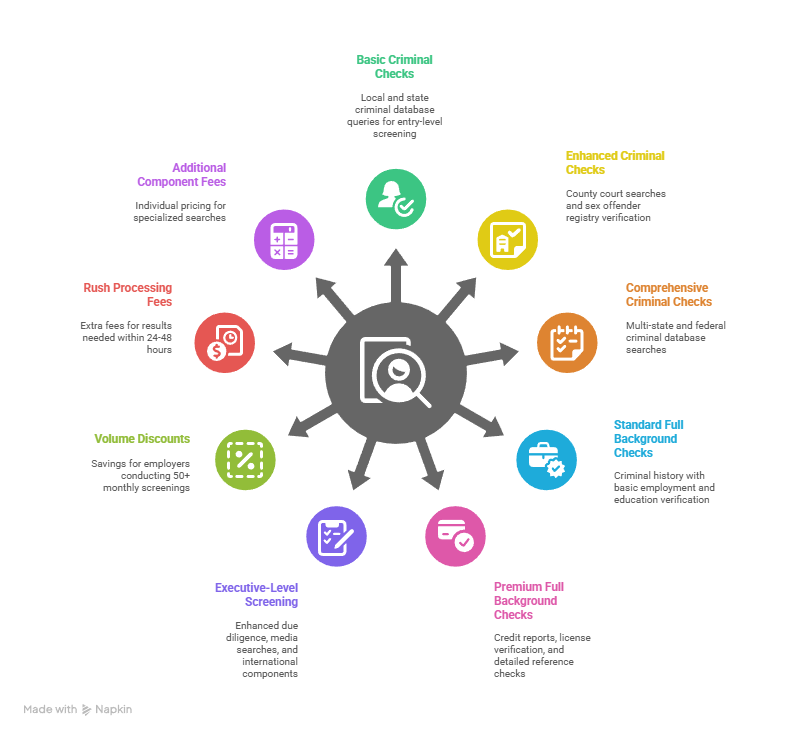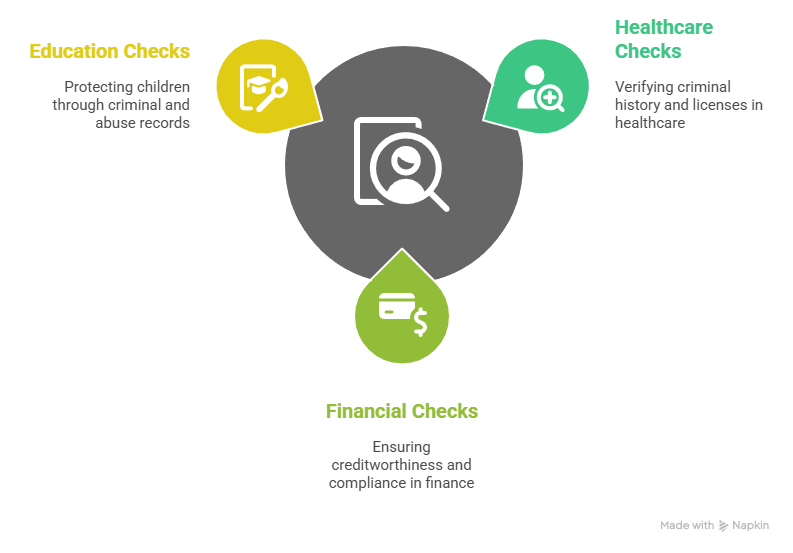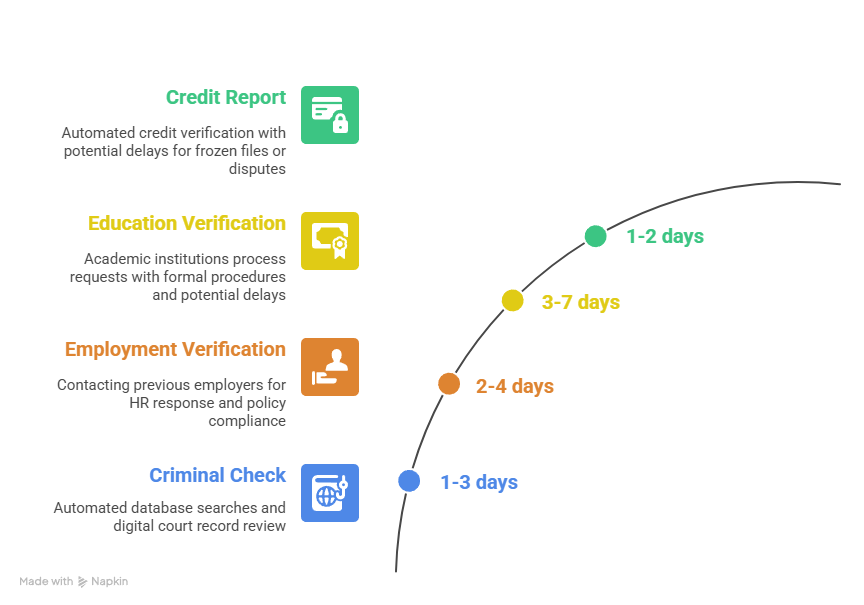Criminal background checks look only at a person's criminal history. This includes arrests, convictions, and court records. Full background checks are much broader. They include criminal history plus employment verification, education credentials, credit reports, and reference checks. Knowing these differences helps employers pick the right screening type. This ensures they meet their hiring needs and legal requirements.
Key Takeaways
- Criminal background checks typically cost $10-30 and take 1-3 business days, focusing solely on criminal records and court databases
- Full background checks range from $50-200 and require 3-7 business days, providing comprehensive candidate information across multiple verification areas
- Criminal checks are suitable for basic compliance and entry-level positions, while full checks are essential for senior roles, financial positions, and security-sensitive jobs
- Legal compliance varies by check type, with criminal screenings governed by FCRA and state ban-the-box laws, while full checks must navigate additional credit reporting and privacy regulations
- Industries like healthcare, finance, and education often require full background checks due to regulatory requirements and fiduciary responsibilities
- Job seekers should expect different timelines and disclosure requirements depending on which screening type employers utilize during their hiring process
What Is a Criminal Background Check?
A criminal background check is a targeted screening process that searches for an individual's criminal history across databases and jurisdictions. This check focuses exclusively on criminal records including felony and misdemeanor convictions, pending charges, active warrants, and sometimes arrest records. Most criminal background checks search county court records, state criminal databases, federal crime databases, and sex offender registries to provide employers with safety information about potential hires. Basic criminal checks typically cover seven years of history and focus on the candidate's current residence and previous addresses. More comprehensive criminal searches may include national databases and multi-jurisdictional searches across all states where the candidate has lived. These checks are essential for workplace safety and help employers make informed hiring decisions while maintaining legal compliance. The automated nature of most criminal database searches allows for quick turnaround times, making them ideal for high-volume hiring situations where speed and cost-effectiveness are primary concerns.
Understanding Full Background Checks
Full background checks represent comprehensive screening solutions that examine multiple aspects of a candidate's history beyond criminal records. These extensive investigations typically include criminal history verification, employment verification covering previous jobs, education credentials validation through direct contact with institutions, professional license validation with state boards, and credit history reports when legally permissible. The comprehensive nature of full background checks provides employers with a complete picture of candidate qualifications and trustworthiness across multiple verification areas. This holistic approach helps identify potential red flags that might not appear in criminal records alone, such as employment gaps or education misrepresentation.
The verification process for full background checks involves coordinating multiple sources and databases to confirm information accuracy across all claimed credentials. Employment verification requires contacting previous employers directly to confirm job titles, dates of employment, and reasons for leaving. Education verification involves reaching out to schools and universities to validate degrees, certifications, and graduation dates. Professional license verification contacts relevant state boards to confirm current license status and any disciplinary actions. This thorough approach takes significantly more time than simple criminal checks but delivers greater confidence in hiring decisions, particularly for positions requiring high levels of trust or specialized qualifications.
Key Differences Between Check Types
Criminal and full background checks serve different purposes for employers. Each type offers unique benefits for specific hiring situations. Smart employers choose the right check based on job requirements and company needs.
| Feature | Criminal Background Check | Full Background Check |
| Primary Focus | Criminal records and court history | Comprehensive verification across multiple areas |
| Average Timeline | 1-3 business days | 3-7 business days (up to 14 for complex cases) |
| Typical Cost Range | $10-30 per candidate | $50-200 per candidate |
| Database Sources | Criminal databases, court records | Multiple verification sources and databases |
| Verification Method | Automated database searches | Manual verification plus database searches |
| Best Use Cases | Entry-level positions, safety screening | Senior roles, regulated industries, licensed positions |
| Compliance Requirements | FCRA, ban-the-box laws, state regulations | FCRA plus credit reporting and privacy laws |
| Information Depth | Criminal history only | Criminal plus employment, education, credit, references |
Many employers use both types strategically in their hiring process. They start with criminal checks for early screening and use full checks for final candidates in important roles.
Cost Analysis and Budget Planning
Budget considerations play a crucial role in determining which type of background check employers should implement. Cost differences between criminal and full background checks can significantly impact overall recruiting expenses. Understanding the detailed pricing structure helps employers optimize their screening investments while maintaining necessary verification standards.

- Basic Criminal Checks ($10-15): Cover local jurisdiction searches and basic state criminal database queries for entry-level screening
- Enhanced Criminal Checks ($20-25): Include county court searches across multiple jurisdictions and sex offender registry verification
- Comprehensive Criminal Checks ($25-35): Add multi-state searches, federal criminal databases, and national crime information databases
- Standard Full Background Checks ($50-75): Combine criminal history with basic employment and education verification for mid-level positions
- Premium Full Background Checks ($100-150): Include credit reports, professional license verification, and detailed reference checks
- Executive-Level Screening ($200-500): Comprehensive verification with enhanced due diligence, media searches, and international components
- Volume Discounts (10-30% savings): Available for employers conducting 50+ monthly screenings with annual contracts
- Rush Processing Fees ($25-50 extra): Applied when results are needed within 24-48 hours for urgent hiring needs
- Additional Component Fees ($15-40 each): Individual pricing for specialized searches like driving records or international education verification
Smart budgeting strategies often involve implementing tiered screening approaches. This graduated method maximizes screening effectiveness while controlling costs across the entire recruitment process.
When to Use Each Screening Type
Choosing the right background check depends on several key factors. Consider the job requirements, industry rules, risk levels, and your budget. Match the screening depth to what the position actually needs.
- Entry-level retail and customer service positions with minimal risk exposure
- High-turnover roles with basic safety requirements and limited access to sensitive areas
- Seasonal or temporary positions where comprehensive verification may not be cost-effective
- Initial screening phases for large applicant pools before narrowing to final candidates
- Transportation and delivery driver positions requiring safety but not comprehensive credentials
- Warehouse and manufacturing roles with equipment operation but limited financial access
- Food service and hospitality positions requiring basic safety verification
- Senior management and executive roles with significant organizational impact
- Financial services positions involving money handling or sensitive financial data
- Healthcare workers with patient access and professional licensing requirements
- Childcare providers and education professionals working with vulnerable populations
- Government contractors requiring security clearances and comprehensive verification
- IT professionals with access to sensitive systems and confidential information
- Legal professionals requiring bar admission and ethical standing verification
- Real estate agents and insurance professionals with fiduciary responsibilities
Create clear rules for which jobs need which types of checks. Many companies use simple charts that automatically show the right screening level for each position.
Industry-Specific Requirements
Some industries have mandatory background check rules set by government agencies. These rules decide if you need basic criminal checks or full background checks. Companies must follow these rules even if they cost more or take longer.

- Healthcare and Medical Fields: Healthcare employers must do full background checks on all workers. These checks include criminal history, license verification, and special database searches. State medical boards set rules about how far back to search, sometimes for a person's entire life.
- Financial Services and Banking: Banks must follow strict federal laws for employee screening. Workers who handle money or see customer financial data need comprehensive background checks. Many banks require good credit scores as a job requirement for financial positions.
- Education and Childcare: Schools and daycare centers must protect children through thorough screening. Background checks must include criminal records, sex offender lists, and child abuse registries. Many states require teachers to get fingerprinted and pass FBI background checks.
These industry rules cannot be ignored and often increase screening costs significantly. Companies in these fields should work with experts to meet all legal requirements.
Position-Based Decision Framework
Creating a systematic approach helps employers make consistent screening decisions. This method ensures fair treatment of all candidates. It also helps companies use their resources wisely. Risk-based frameworks look at several key factors. These include access to sensitive information and financial responsibility levels. They also consider public safety impact and regulatory requirements. The framework examines potential liability exposure for each role. This structured approach keeps screening practices consistent across the organization. It helps maintain legal compliance with equal employment laws.
The framework sorts positions into different risk levels. Each level matches specific screening needs and budget amounts. High-risk positions need full background checks. These include executives, financial officers, and IT administrators. Healthcare workers and childcare providers also fall into this category. They have access to sensitive data or face strict regulatory requirements. Mid-level positions may need criminal checks plus other specific verifications. Supervisors and customer-facing roles with money handling are examples. These might require education or license confirmation. Entry-level roles usually need only basic criminal screening. The framework must also consider special circumstances. Remote work arrangements may increase security risks. Some positions involve travel to sensitive locations. Others require security clearances or access to confidential information. These factors may require enhanced screening regardless of position level.
Legal Compliance and Best Practices
Background check compliance involves following federal and state laws. These rules vary by location and change often. Both criminal and full background checks must follow FCRA requirements, but full checks have extra rules for credit reports and education verification.
| Compliance Area | Criminal Checks | Full Background Checks |
| FCRA Disclosure Requirements | Pre-screening written disclosure required | Separate disclosures needed for each component |
| Candidate Consent Procedures | Single blanket authorization acceptable | Credit reports require separate specific consent |
| Adverse Action Process | Standard pre-adverse and adverse action notices | Multiple notices may be required for different components |
| Ban-the-Box Legislation | Direct timing restrictions on criminal inquiries | Affects only criminal history portion of screening |
| State Lookback Period Limits | Varies from 7 years to lifetime depending on state | Applies differently to criminal vs. other components |
| Industry-Specific Regulations | Position and sector-specific requirements vary | Comprehensive compliance across multiple regulatory areas |
| Record Retention Requirements | Minimum 1 year post-hire or application | Extended retention for credit and medical information |
| Dispute Resolution Procedures | FCRA dispute process for criminal records | Complex multi-source dispute resolution required |
Choose background check providers who know current laws and stay updated on changes. Regular training and legal consultation help avoid costly violations and lawsuits.
Timeline and Process Management
Managing background check timelines effectively requires understanding processing speed factors and building appropriate expectations into hiring workflows. Timeline variations between criminal and full background checks can significantly impact hiring velocity and candidate experience, making strategic planning essential. Effective management involves setting realistic expectations while building in contingency time for verification delays.

- Criminal Check Processing (1-3 days): Most criminal background checks complete within 24-72 hours due to automated database searches and digital court records. Delays occur when court records require manual retrieval or when candidates have lived in multiple jurisdictions requiring separate searches. Rush processing options are available for additional fees when faster decisions are needed.
- Employment Verification (2-4 days): Contacting previous employers often takes longer due to HR response times and information release policies. Large corporations may process requests faster through centralized systems, while smaller employers require multiple contact attempts. International employment verification extends timelines significantly and may require specialized services.
- Education Verification (3-7 days): Academic institutions have formal procedures for releasing information that involve multiple departments and verification steps. International education presents challenges including time zones, language barriers, and varying institutional policies. Peak periods like graduation seasons create delays at institutions processing high verification volumes.
- Credit Report Processing (1-2 days): Credit verification processes quickly through automated systems but delays occur with frozen files or disputed information. Complex situations involving identity theft or bankruptcy may require additional verification steps. Candidates may need to provide documentation or lift credit freezes temporarily.
Effective process management involves communicating realistic timelines to stakeholders and building flexibility into hiring schedules. Organizations with regular hiring needs establish relationships with multiple providers for backup options during peak periods.
Conclusion
The choice between criminal and full background checks depends on your specific needs. Consider your hiring requirements, legal obligations, risk levels, and budget constraints. These factors vary across different positions and industries.
Criminal checks work well for basic safety screening. They're cost-effective for entry-level positions. Full background checks provide thorough verification for senior roles. They're essential for regulated industries and specialized positions requiring high trust levels.
Understanding these differences helps you build better screening programs. You can balance thoroughness with efficiency. This ensures proper verification while managing costs and timelines effectively.
Success requires ongoing attention to legal compliance. Update policies regularly to reflect changing regulations. Partner with reputable screening providers for reliable results and fair hiring practices.
Frequently Asked Questions
What's the main difference between criminal and full background checks?
Criminal background checks focus solely on an individual's criminal history, including convictions and arrests, while full background checks include criminal history plus employment verification, education validation, credit reports (when permitted), and reference checks for comprehensive candidate evaluation.
How long do criminal vs. full background checks take to complete?
Criminal background checks typically complete within 1-3 business days since they primarily involve database searches, while full background checks require 3-7 business days due to manual verification processes involving contact with employers, schools, and references.
Which type of background check is more cost-effective for employers?
Criminal background checks cost $10-30 per candidate, making them more budget-friendly for high-volume hiring, while full background checks range from $50-200 but provide comprehensive verification that may reduce long-term hiring risks and turnover costs.
Are there legal differences between conducting criminal vs. full background checks?
Both types require FCRA compliance, but full background checks face additional regulations, particularly for credit report usage, which requires specific permissible purposes and separate consent, while criminal checks must navigate ban-the-box laws and state-specific restrictions.
When should employers choose full background checks over criminal checks?
Full background checks are essential for senior positions, financial roles, healthcare workers, and jobs requiring specific credentials or security clearances, while criminal checks work well for entry-level positions and basic safety screening needs.
Can employers combine criminal checks with selected components of full background checks?
Yes, many employers create customized screening packages that include criminal checks plus specific components like employment or education verification, allowing them to tailor screening depth and costs to particular position requirements and risk levels.
Additional Resources
- FCRA Compliance Guide for Employers
https://www.ftc.gov/business-guidance/resources/fair-credit-reporting-act - EEOC Background Check Guidelines
https://www.eeoc.gov/laws/guidance/background-checks - State Ban-the-Box Legislation Database
https://www.nelp.org/campaigns/opportunity-agenda/ban-the-box/ - Professional Background Screening Association Resources
https://www.professionalbackground.org/

GCheck Editorial Team
Meet the GCheck Editorial Team, your trusted source for insightful and up-to-date information in the world of employment background checks. Committed to delivering the latest trends, best practices, and industry insights, our team is dedicated to keeping you informed.
With a passion for ensuring accuracy, compliance, and efficiency in background screening, we are your go-to experts in the field. Stay tuned for our comprehensive articles, guides, and analysis, designed to empower businesses and individuals with the knowledge they need to make informed decisions.
At GCheck, we're here to guide you through the complexities of background checks, every step of the way.





